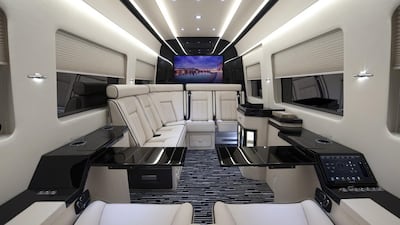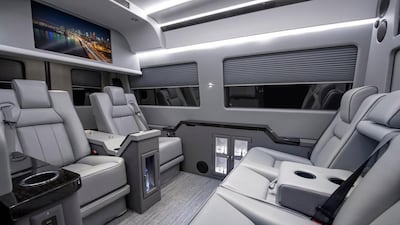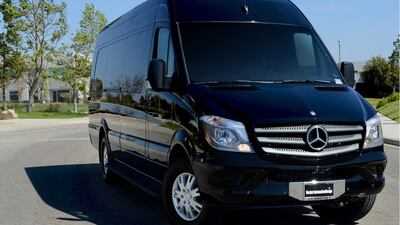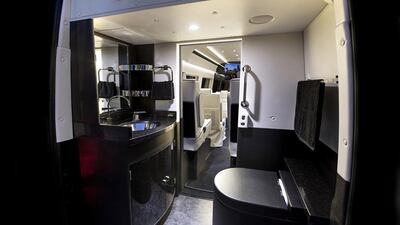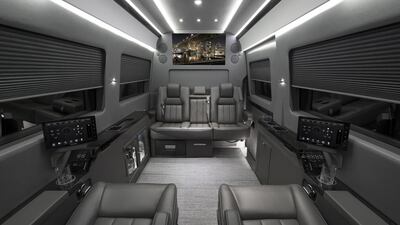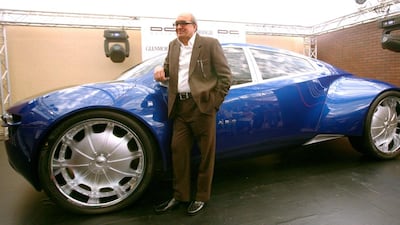In India, where private drivers are already a middle class staple, one man has created an entirely new category of executive wheels: the mobile office.
Indeed, the handiwork of Dilip Chhabria, an erstwhile GM engineer, is discreetly visible across India. His firm, DC Design, co-opts battered Toyota Highlanders and retrofits the interiors with amenities like Wi-Fi, touchscreen TVs, soundproofing, and airline pod-style seats expressly to answer one of the city’s biggest problems – traffic. Conveniently transformed, these SUVs now make short order of ever longer commutes, turning them into just another day at the (mobile) office.
Nowhere is more fertile a base for DC’s designs than Mumbai: private vehicle numbers there have risen 57 per cent in less than a decade, and by one estimate, 200 new cars join the traffic jam every day. While it’s typical of many of the nascent megatropolises in emerging markets, from Bangkok to Brazil, where the roadways are buckling after the economic boom, it’s also an issue in the US – just ask the California businessman Mark Hyman.
“I’m born and raised in California, and years ago traffic was predictable,” he explains “Now? It’s totally unpredictable, and you have to leave a minimum of two hours early to get to a meeting even close to on time.”
He tapped Howard Becker to address this, the owner of Beverly Hills-based Becker Auto Design. Since starting out 40 years ago customising cars with high-end stereos for celebrity clients, Mr Becker has moved into the mobile office space to become America’s premier car up-fitter.
It’s an increasingly lucrative market. According to the most recent figures from the traffic tracking firm Inrix, as GDP rises, mph falls. Traffic trends show congestion is worsening in urban centres where the tech sector is strong. That’s in addition to already-gridlocked cities like New York (53 hours wasted in traffic per year), Washington, DC (40 hours) and Mr Becker’s local market Los Angeles (60 hours).
“Even in the first world, the major metropolitan areas are all behind in infrastructure,” Mr Becker says. “What drives our business is the ability for our customers to get things done even when they’re driving. The red Ferrari is still in the garage for fun at weekends, but they’re thinking, at least on weekdays, ‘I can’t afford to drive myself any more.’”
Mr Becker offers two core mobile offices, one of which based off a Mercedes-Benz Sprinter that he has dubbed the JetVan. It can accommodate up to seven people like a truly (and luxurious) mobile conference room, or a cosier alternative hewn from a Cadillac Escalade ESV (although that, too, can be discreetly stretched to squeeze in four conference seats).
Most desk-bound execs would envy the in-motion amenities he offers: plush leather seats, fine wood inlays, blazing fast Wi-Fi, media systems with touchscreen menus offering live TV, video on demand, and local programming from any major city. You can even get a printer. “My clients can basically run most of their world, if not the world, from that position,” Mr Becker promises.
Each project begins with a consultation after which Mr Becker’s team will create a 3D animated walk-through of the customised fit-out. Often, his tech-savvy clients are keen to incorporate prototypes or beta test software on board, so Mr Becker works with a team of IT staffers to adapt it to a car.
His strangest request came from the chief executive of a New York Stock Exchange company who had moved the firm’s headquarters from one city to another but decided not to move house himself. The corporate relocation therefore added an hour to the executive’s commute each way, squeezing his daily routine so that exercise was almost impossible.
“He told me ‘I can’t imagine living without cardio – can you do an exercise thing for me?’” Mr Becker recalls. So the designer took a recumbent exercise bike and chopped it in half, replacing the standard seat with an alternative that was safety-certified for cars, then wedged the Frankenbike into the back of the SUV. “He could sit back there and pump his little heart out to his heart’s content and still wouldn’t go flying out if there was a front collision.”
The average project takes about seven months to complete and costs $250,000 to $450,000 for a Mercedes Sprinter refit.
Philip Daskal of Inkas, a Toronto-based firm, refitted a Sprinter for three-quarters of a million dollars for a celebrity businessman in the Philippines. (Mr Daskal estimates that emerging markets like India comprise more than 75 per cent of his business.)
“What could take 15 minutes to drive in North America, could take two to three hours in Manila, so it’s forever to get to places,” Mr Daskal recalls. So alongside the 50-inch flat screen, satellite phones and massage seats, came the client’s more practical requirement: a toilet. Inkas turned to the same kind of lightweight eco-friendly toilets common on high-end yachts, installing it at the rear complete with chrome sinks. “It even had its own exhaust, so the smell wouldn’t linger.”
business@thenational.ae
Follow The National's Business section on Twitter
